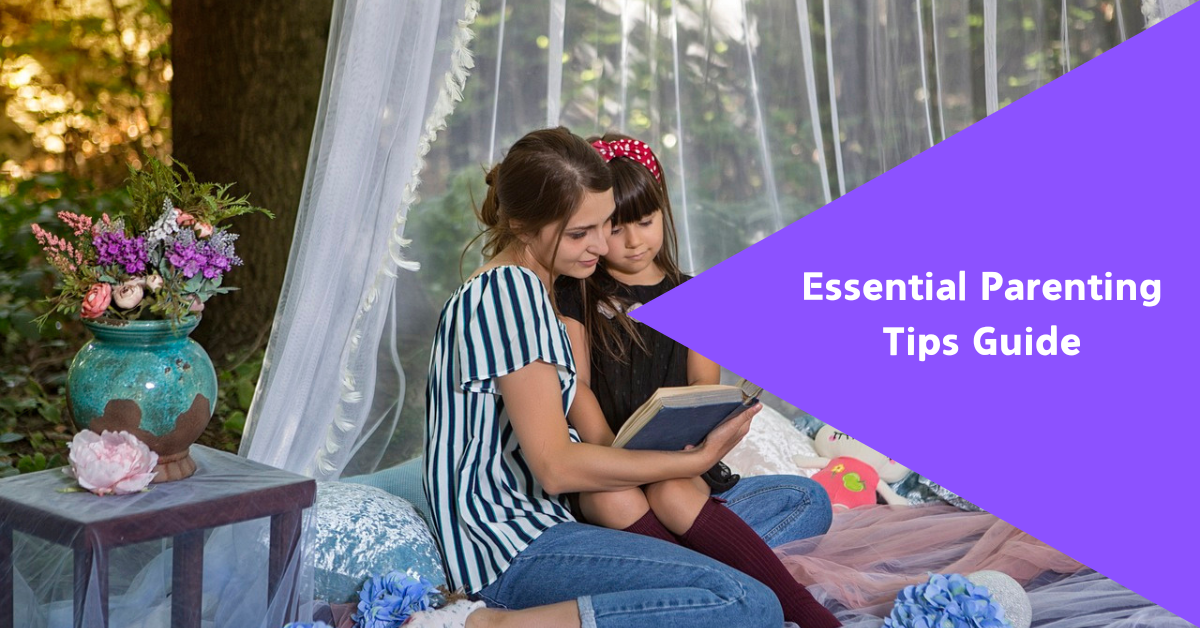Parenting is a beautiful journey filled with challenges, learning, and love. Every stage in your child’s life brings new responsibilities, joys, and experiences. As parents, it is natural to feel overwhelmed sometimes but with the right guidance, you can confidently navigate these stages.
This essential parenting tips guide covers the most effective strategies for raising happy and healthy kids.
1. Build a Strong Bond Early
Building a strong bond with your child from an early age is crucial. Engage in bonding activities like reading together, playing games, and spending quality one-on-one time. The early years set the foundation for a trusting and open relationship that will benefit both you and your child as they grow.
Tip: Dedicate at least 15 minutes each day to interact with your child without distractions, focusing on meaningful conversation or play.
2. Set Clear Boundaries
Children thrive on routine and clear expectations. Setting age-appropriate boundaries helps them understand what is acceptable and what is not. Consistency in enforcing rules also builds respect and discipline.
Tip: Create a routine that includes time for homework, play, and chores. Establishing these patterns early helps children develop a sense of responsibility and structure.
3. Encourage Open Communication
Effective communication is key in any relationship. Encourage your child to express their feelings and thoughts openly without fear of judgment. Being a good listener can strengthen your connection and help your child to be satisfied.
Tip: Practice active listening. When your child talks, give them your full attention and ask open-ended questions to improve the connection.
4. Promote Positive Discipline
Positive discipline focuses on teaching rather than punishing. This approach involves setting limits, offering consequences, and explaining why certain behaviours are inappropriate. Instead of shaming, guide your child to make better choices.
Tip: When correcting behavior, explain why the action was wrong and offer positive alternatives. Praise good behaviours to make your child happy.
5. Teach Responsibility Early

Teaching responsibility helps children understand the impact of their actions. Give them age-appropriate tasks like cleaning up toys or helping set the table. As they grow, they gradually increase their responsibilities to build their confidence.
Tip: Use a reward system to encourage the completion of chores like a sticker chart or extra playtime for consistently helping out around the house.
6. Model Healthy Habits
Children learn by watching their parents. Modeling healthy habits such as a balanced diet, regular exercise, and good sleep teaches them the importance of a healthy lifestyle.
Tip: Sit together as a family for meals to foster a positive relationship with food and promote healthy eating habits.
7. Prioritize Emotional Well-being
A child’s mental health is as important as their physical health. Encourage them to talk about their feelings and offer a safe space where they feel comfortable sharing. Teach them to handle emotions in healthy ways like breathing exercises or taking a break when they feel upset.
Tip: Incorporate emotional check-ins, especially after school or a significant event. This gives your child the chance to process and share any feelings they may have.
8. Encourage Lifelong Learning
Help foster curiosity and a love for learning by creating an engaging home environment. Read books together, engage in educational games, and encourage questions. Celebrate their efforts in school and extracurricular activities to motivate them further.
Tip: Designate a quiet study space and encourage regular reading time. Simple routines like these can instill a lifelong love for learning.
9. Be Patient and Flexible
Parenting requires patience and the ability to adapt. As children grow, their needs and personalities change. What worked at one stage may not work at the next. Being patient and flexible helps you respond to these changes with understanding.
Tip: When feeling overwhelmed, take a moment to pause and reset. A calm approach can make a big difference in resolving issues and fostering a positive environment.
10. Seek Support When Needed
Parenting doesn’t have to be only one person’s journey. Seek support from family, friends, or parenting groups. Connecting with others provides you with fresh perspectives, support, and shared experiences can be helpful.
Tip: Join online parenting communities or local support groups. These spaces offer valuable insights and advice from other parents who may have gone through similar experiences.
Conclusion
The journey of parenting is a continuous learning process. By focusing on the essential parenting guide given above, you can nurture a loving and supportive environment for your child to thrive.
Remember, there is no perfect approach to parenting but with patience, consistency, and love, you can create a positive and rewarding parenting experience. Whether you are a new parent or have older children, these essential parenting tips can serve as a guide to help you raise happy and responsible kids.
Enjoy the journey, cherish the moments, and trust in your abilities by following the essential parenting tips guide given above.
Why KidsCur?
To help every parent in parenting, we provide medical information related to your children in just one app. This helps parents get access to all the medical information digitally which reduces the workload of taking all the necessary documents during treatment of your kids.
From storing documents to booking appointments, KidsCur offers an all-in-one solution for parents. To learn more about our services, contact us!

